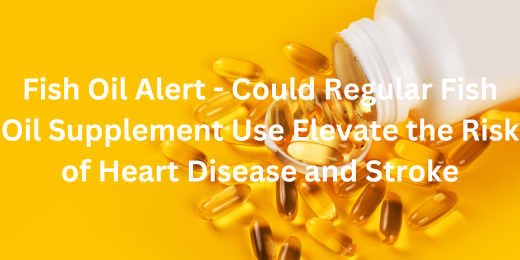
Fish Oil Alert – Could Regular Fish Oil Supplement Use Elevate the Risk of Heart Disease and Stroke
Fish oil supplements and heart disease
Introduction to Fish Oil Supplements and Cardiovascular Health
Fish oil supplements are popular for their potential health benefits, especially in improving cardiovascular health. These supplements are rich in omega-3 fatty acids, which are crucial for maintaining heart health. However, it is important to understand the balance between fish oil benefits vs risks. This blog post draws inspiration from research published in an article by the British Medical Journal (BMJ).
Omega-3 fatty acids, found in fish oil, are essential for reducing inflammation and lowering blood pressure. A decreased likelihood of heart disease may result from these advantages. Despite these advantages, recent studies have raised concerns about the potential risks associated with fish oil supplements and heart disease.
Some research suggests that while fish oil supplements can provide significant health benefits, they may also pose risks if not used properly. The key is to weigh the fish oil benefits vs risks to ensure safe and effective use. A healthcare provider should always be consulted before beginning a supplement routine.
Positive Effects of Fish Oil Supplements on Cardiovascular Health
Fish oil supplements are known for their positive effects on cardiovascular health. They can slow the progression of existing poor cardiovascular conditions by reducing inflammation and improving blood flow. This underscores the complex relationship between fish oil supplementation and cardiovascular health outcomes.
Individuals with cardiovascular diseases may benefit from fish oil supplements, as they have been linked to a lower risk of death. This benefit underscores the importance of considering fish oil benefits vs risks when evaluating treatment options. There is a considerable chance that survival rates may increase.
The mechanisms by which fish oil supplements prevent disease include lowering triglycerides and blood pressure. These actions contribute to a healthier heart and circulatory system. Understanding fish oil benefits vs risks helps individuals make informed choices about their health.
Risks Associated with Fish Oil Supplements
While fish oil supplements are often praised for their health benefits, there are risks associated with their use. Recent research suggests that healthy people have a higher risk of developing heart disease and stroke for the first time. This poses queries pertaining to fish oil supplements and heart disease.
Research suggests fish oil supplements might also be associated with an increased risk of stroke and atrial fibrillation. This underscores the need to balance fish oil benefits vs risks when considering their use. It is important to realize the advantages and shortcomings equally.
The negative effects of fish oil supplements can be influenced by variables like gender, age, and lifestyle. These factors need careful consideration to avoid potential health issues. Weighing fish oil benefits vs risks helps ensure safe and effective usage.
Effects of Fish Oil Supplementation on the Course of Disease
Fish oil supplements play a crucial role in health, particularly in slowing disease progression. They are noted for their potential in preventing heart disease from conditions like atrial fibrillation advancing to more serious issues such as heart attacks. This underscores their impact on cardiovascular health.
Furthermore, fish oil supplements have shown effectiveness in reducing the progression of heart failure to fatal outcomes. This highlights their role in improving cardiac health outcomes and potentially extending life expectancy in individuals with existing heart conditions.
The long-term implications of fish oil supplements on cardiovascular events are significant. Research suggests they may help mitigate the risks associated with heart disease and other related conditions, promoting overall heart health. Understanding these benefits versus potential risks is crucial for informed health decisions.
Study Insights and Methodology
The UK Biobank study provides valuable insights into the effects of fish oil supplements on heart disease. This large-scale research involved participants from diverse demographics across the UK, aiming to understand the impacts of lifestyle factors on health outcomes.
Participants were monitored over an extended period, with data collected through detailed health questionnaires, medical records, and biomarker analysis. This rigorous approach allowed researchers to track the incidence of heart disease and stroke among supplement users and non-users alike.
Statistical analysis of the data revealed nuanced findings regarding the benefits and potential risks of fish oil supplements. Researchers interpreted these findings cautiously, considering factors such as age, gender, and overall lifestyle habits, to provide a comprehensive view of their impact on cardiovascular health.
Conclusion and Future Directions
The findings from studies on fish oil supplements and their impact on heart disease suggest both benefits and risks that warrant careful consideration. While these supplements may offer potential advantages in cardiovascular health, such as reducing triglyceride levels and inflammation, there are also concerns about their effects on other aspects of heart health.
Moving forward, it is crucial to conduct more research that includes diverse populations to better understand how fish oil supplements affect different demographic groups. This will help tailor recommendations more effectively, taking into account factors like genetic predisposition and lifestyle habits.
Seeking advice from medical authorities is advised for anyone thinking about taking fish oil supplements. They can provide personalised advice based on current health status and potential risks associated with these supplements. Making informed decisions about supplementation is key to optimising heart health outcomes.